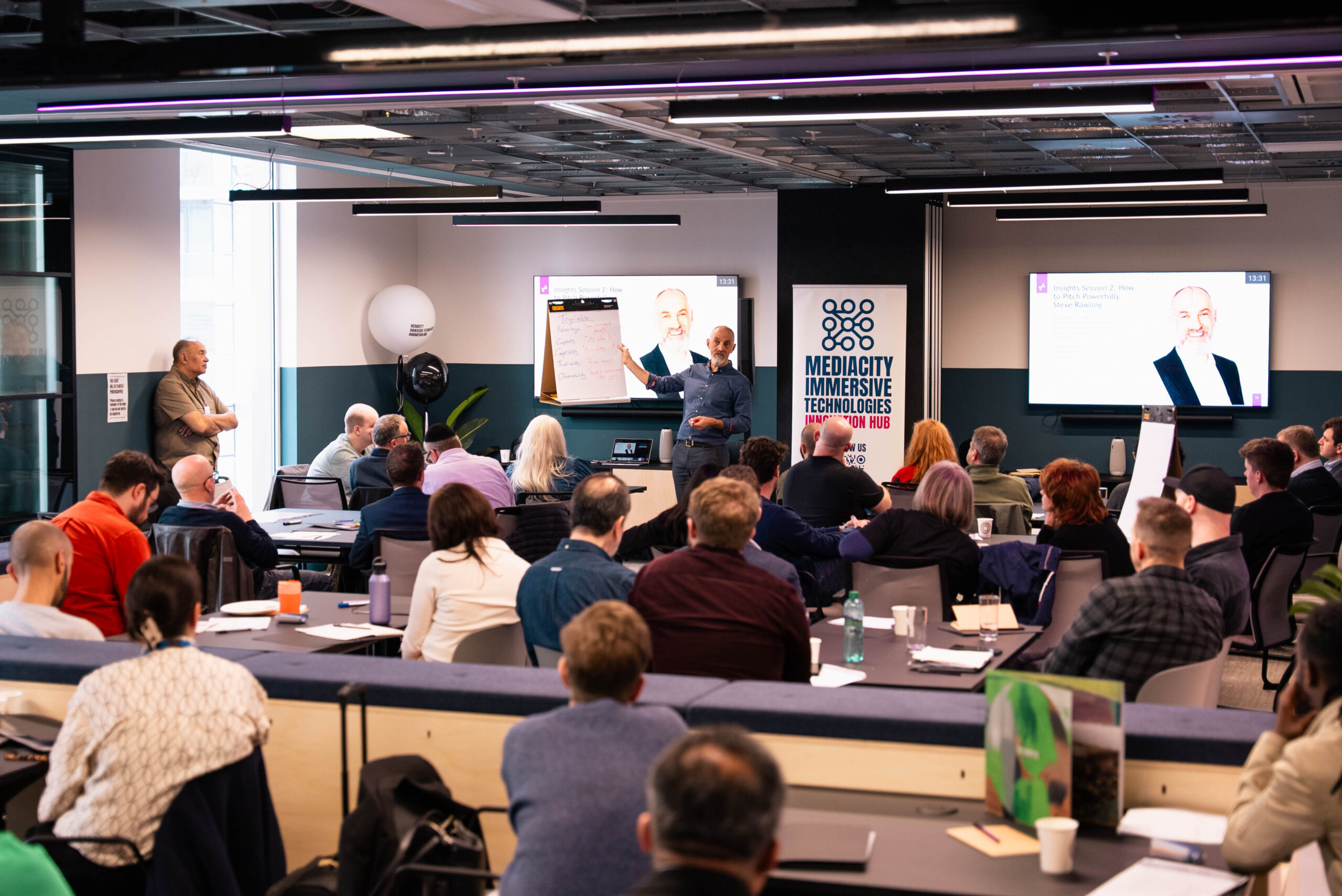How collaborations between healthcare, industry and communities is helping to shape the future of care for patients in Greater Manchester

A collaboration between healthcare professionals, creative industries and patient representatives from Greater Manchester has shown the value of cross-sector collaboration when working to improve the delivery of care for patients across the region.
An event commissioned by MediaCity Immersive Technologies Innovation Hub in partnership with Health Innovation Manchester, as part of the Health Innovation Accelerator programme, brought together professionals from healthcare and creative industries to better understand the experiences of patients when accessing healthcare screening opportunities.
The event was an opportunity for attendees to create innovative concepts which could help to tackle some of the region’s most common health challenges. Attendees from creative agencies, such as animators, filmmakers, social media creatives and designers heard first-hand how experiences can impact on how patients engage with the local healthcare system, before being given the opportunity to submit ideas to a judging panel made up of healthcare professionals and patient representatives.
Dr Nicholas Black, Cardiology Clinical Research Fellow at Manchester University NHS Foundation Trust (MFT), attended the event and presented on the progress of the Early Detection of Heart Failure programme, and how using innovative solutions helped to promote this research opportunity to test patients at risk of heart failure. He said: “It was really great to be a part of the Innovation Hack Day Event. I gave a talk on the innovative recruitment strategies we are using as part of our research study ‘Detecting EARLY Heart Failure in Greater Manchester (EARLY-HF)’. I also acted as a judge for the ideas pitched by the creative teams. It’s the first time I’ve been at an event with a combination of clinicians, NHS innovations managers, and representatives from creative industries in the same room working on the same problem. This collaboration led to some really interesting ideas.”
Eric Lowndes, a resident in Greater Manchester and a member of the Health Innovation Manchester PPIE panel attended the session to speak with attendees, whilst presenting on his healthcare experiences and how he has benefitted from taking up screening opportunities to help him better understand his own health. He said: “When I was 60 years old, I had a stroke and because I had a stroke that promoted me to get involved with organisations like Health Innovation Manchester. The event was fantastic because we did have the clinicians involved, we had innovators, and we had the general public, and we all contributed to what was a very interesting day.”
Four teams selected on the day were given more time and a small amount of funding to further develop their ideas before they were put to the judging panel. Their ideas and campaigns focussed on themes such as community engagement, building trust and tackling issues such as social isolation and low uptake of screening opportunities. The top two ideas selected by the panel were led by Ben Hutchinson of Submarine Films, and Tom Parsons, of Big Echo, and Steve Ryde.
Daniel Zamora, Programme Director – Health Innovation Accelerator at Health Innovation Manchester, said: “This is very important to us as we’re bringing the best of the creative sector and immersive technologies, with the best of the healthcare sector and innovation. What we heard was different perspectives, perspectives from people who don’t traditionally work in the healthcare sector and perspectives from those in the creative industries that use technologies that are not traditionally accessible in the healthcare sector. So, we’re hopeful to see solutions that we would not have seen before and learn how we can better engage with our communities in the future.”
Mario Dubois, Creative Director, Unstoppable Creative Media, who designed and delivered the Hackathon said: “This initiative was important on three levels. Firstly, it paired two different new creative communities together – the creative and media industries and the health technology industry, with a focus on solving an essential problem with innovative solutions and approaches. The creative industries community brought their audience-facing creativity and ability to find new and innovative solutions and approaches, matched with meeting patients’ needs and improving behaviours and improving productivity.
“Secondly, it drove home how innovation could be a critical factor in finding a people-centric problem with many experts involved in ideation and the brainstorming of ideas. Finally, it was noted that the solutions centred on hearing from the audience of patients, who had real-life, firsthand experience of the issues and lack of engagement, so that they could inform ideas into tangible ones that would meet the project’s ambitions and requirements. Ultimately, we saw many new and creative ideas which helped to incentivise patients to engage and participate, potentially increasing efficiency through innovation.”
The Health Innovation Accelerator
The Health Innovation Accelerator encompasses two projects, the Advanced Diagnostics Accelerator and the DEVOTE programme, delivered through a partnership between Health Innovation Manchester, Manchester University NHS Foundation Trust (MFT), The University of Manchester, and industry partners.
This project is part-funded by the Greater Manchester Innovation Accelerator programme. Led by Innovate UK on behalf of UK Research and Innovation, the pilot Innovation Accelerators programme is investing £100m in 26 transformative R&D projects to accelerate the growth of three high-potential innovation clusters – Glasgow City Region, Greater Manchester and West Midlands. Supporting the Government’s levelling-up agenda, this is a new model of R&D decision making that empowers local leaders to harness innovation in support of regional economic growth and help attract private R&D investment and develop future technologies.


